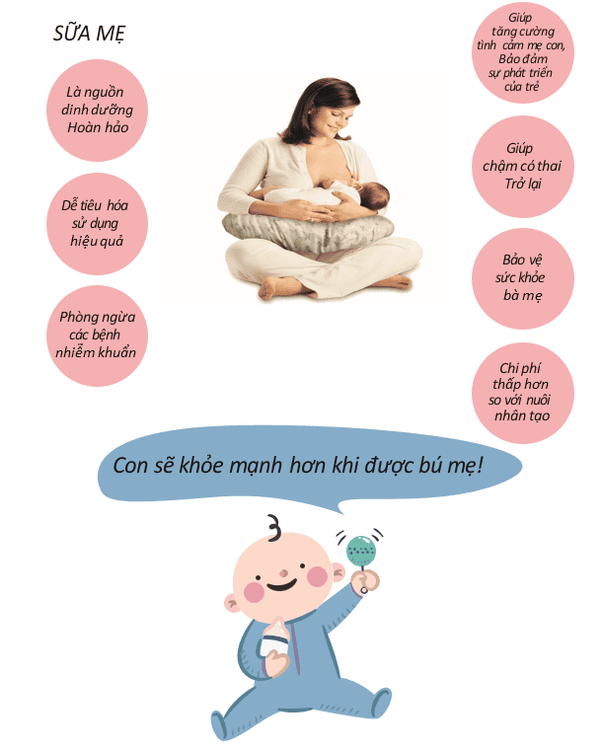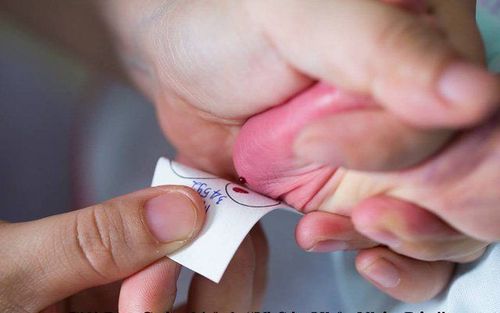This is an automatically translated article.
The article is professionally consulted by Master, Doctor Nguyen Van Thanh - Obstetrician and Gynecologist - Department of Obstetrics and Gynecology - Vinmec Nha Trang International General HospitalBreast milk is the best source of nutrition for the growth of infants and young children. Breastfeeding is not only good for the baby but also brings many unexpected benefits for the mother. So what are those benefits?
1. How long should you breastfeed your baby?
You should breastfeed your baby for at least six months to a year or longer if both you and your baby want to.
2. How is breastfeeding beneficial for the baby?
Breast milk is the best food for your baby for the following reasons:
Breast milk has the necessary amount of fats, sugars, water, proteins and minerals for your baby's growth and development. In each stage, breast milk will change to match the nutritional needs and development of the baby. Breast milk is easier to digest than formula milk. Breast milk contains antibodies that help protect babies from illnesses, such as ear infections, diarrhea, respiratory illnesses and allergies. Reduces the risk of sudden infant death syndrome (SIDS).
3. How good is breastfeeding for the mother?
Breastfeeding is good for the mother for the following reasons:
Helps release the hormone oxytocin, which causes the uterus to contract. This helps the uterus return to its normal pre-pregnancy size and shape and soon stops postpartum vaginal bleeding. Make it easier for moms to lose weight to quickly return to their pre-pregnancy weight. Breastfeeding may reduce the risk of breast and ovarian cancer.

4. How to breastfeed properly?
Hold baby facing you, head level with your nipple. You can then use your fingers to gently lift or adjust the nipple to your baby's mouth. When you see that the baby's mouth has opened wide, bring the baby's face close to the chest, chin touch first, so that the baby's lower lip and tongue contact the breast first. Once your baby has latched onto your nipple, hold your baby in a firm, stable position close to your breast.
5. Signs that your baby is hungry
The first signs that the baby is hungry is sucking his thumb, moving his arms and legs continuously, and pressing his head to the chest of the person holding it. The final sign is fussiness when the baby wants to breastfeed. When full, your baby will make a few gestures for you to know such as pursed lips, turned his head in another direction, sucked on the nipple or dozed off, slowed or stopped feeding.
6. How long should breastfeeding sessions last?
Let your child set his own schedule. During the first weeks of life, most babies feed at least 8-12 times in 24 hours, or every 2 to 3 hours (from the time when the next feed begins). Many babies breastfeed for 10-15 minutes on one breast. Even the feeding time can range from 60-120 minutes at a time. Some babies want to feed on both sides from day one, others only need to feed on one side at a time. Next time, feed your baby from the other side, to make sure both breasts are stimulated and are drained frequently.
7. What foods should you eat while breastfeeding?
The following tips will help you meet your nutritional goals while breastfeeding:
Your body needs about 450-500 extra calories per day to make breast milk for your baby. Eat fish and seafood 2-3 times a week, but avoid high-mercury fish. Do not eat swordfish, mackerel, tilefish or tuna. Take a multivitamin every day Drink plenty of water (especially if your urine is dark yellow).
8. Should stimulants be used while breastfeeding?
Drinking caffeine in moderation (200mg per day) probably won't have much of an effect on your baby. However, babies are often sensitive to caffeine, so you should limit your intake.
When the mother drinks alcohol, a small amount passes through the breast milk. If a large amount of alcohol in breast milk will cause growth retardation, abnormal weight gain, deep sleep... On average, it will take about 2 hours for 1 unit of alcohol to be completely eliminated, so, If the mother "accidentally" drinks such an amount of alcohol, then wait more than 2 hours before breastfeeding.
Smoking is very harmful to the health of babies. It increases the risk of allergies, asthma and SIDS. Smoking also reduces your milk supply and makes it harder for your baby to gain weight. It is best not to smoke next to the baby.
Also, using illegal drugs, such as cocaine, heroin and methamphetamine can harm your baby if you use them while breastfeeding.
Please dial HOTLINE for more information or register for an appointment HERE. Download MyVinmec app to make appointments faster and to manage your bookings easily.
Reference source: Acog.org













